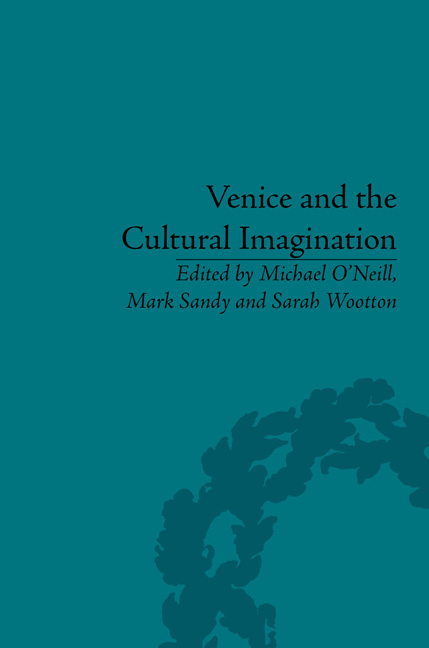Book contents
- Frontmatter
- CONTENTS
- Acknowledgements
- List of Figures
- Notes on Contributors
- Introduction
- 1 A ‘More Beloved Existence’: From Shakespeare's ‘Venice’ to Byron's Venice
- 2 Reimagining Venice and Visions of Decay in Wordsworth, the Shelleys and Thomas Mann
- 3 J. M. W. Turner and the ‘Floating City’
- 4 Venice and Opera: Tradition, Propaganda and Transformation
- 5 Venice, Dickens, Robert Browning and the Victorian Imagination
- 6 ‘The Lamp of Memory’: Ruskin and Venice
- 7 Edith Wharton's ‘Venetian Backgrounds’
- 8 Henry James's Venice and the Visual Arts
- 9 The Myth of Venice in the Decline of Eliot and Pound
- 10 Representations of Venice in Daphne du Maurier's Don't Look Now and Nicolas Roeg's Screen Adaptation
- Notes
- Select Bibliography
- Index
10 - Representations of Venice in Daphne du Maurier's Don't Look Now and Nicolas Roeg's Screen Adaptation
- Frontmatter
- CONTENTS
- Acknowledgements
- List of Figures
- Notes on Contributors
- Introduction
- 1 A ‘More Beloved Existence’: From Shakespeare's ‘Venice’ to Byron's Venice
- 2 Reimagining Venice and Visions of Decay in Wordsworth, the Shelleys and Thomas Mann
- 3 J. M. W. Turner and the ‘Floating City’
- 4 Venice and Opera: Tradition, Propaganda and Transformation
- 5 Venice, Dickens, Robert Browning and the Victorian Imagination
- 6 ‘The Lamp of Memory’: Ruskin and Venice
- 7 Edith Wharton's ‘Venetian Backgrounds’
- 8 Henry James's Venice and the Visual Arts
- 9 The Myth of Venice in the Decline of Eliot and Pound
- 10 Representations of Venice in Daphne du Maurier's Don't Look Now and Nicolas Roeg's Screen Adaptation
- Notes
- Select Bibliography
- Index
Summary
‘A bright façade put on for show’, Daphne du Maurier's Venice in Don't Look Now is a city of shifting and shimmering intangibility, ambiguity and contrast, both ‘glittering by sunlight’ and, in its ‘dark stillness’, ‘rather sinister’. Her short story posits Charles Dickens's ‘strange Dream upon the water’ as a psychological space, yet the city is configured not simply as a place of reverie, a means of imaginative and emotional escape, but as a bleak prison of haunting insecurity, disturbance and disorientation, ‘the lights everywhere blending with the darkness’. Du Maurier's language is consequently shadowed by threat and ambivalence, as she constantly constructs and then deconstructs ‘the magic’ and romance of Venice, breaking Henry James's ‘Venetian spell’ in Don't Look Now (1971) and her earlier work, Ganymede (1959); in both short stories, her meditation upon death and murder realizes, to unsettling effect, James's illustration of Venice as ‘the most beautiful of tombs’. Above all, du Maurier highlights and yet challenges the propensity to idealize and aestheticize ‘this most improbable of cities’ through the act of gazing, signified by the very title Don't Look Now.
As Tanner contends, ‘Venice seen is “Venice” lost’. In this, it would seem that filming ‘the enchanted city’ becomes intrinsically problematic. Constructed as a picture by the camera lens and imprisoned within its frame, visualizing Venice arguably both succumbs to cliché and fails to realize its enchantment, its elusive and ethereal quality; rather than ‘seeing’ the city, for example, Nietzsche proclaimed that in seeking ‘another word for music, I always find only the word “Venice”’.
- Type
- Chapter
- Information
- Venice and the Cultural Imagination'This Strange Dream upon the Water', pp. 157 - 172Publisher: Pickering & ChattoFirst published in: 2014



